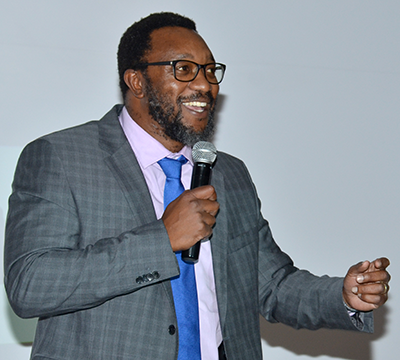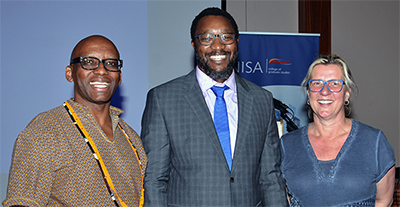Leading change
Magic we need to change Africa is right inside us

Speaking at the CGS Fifth Interdisciplinary Summer School at Unisa, Muzi Kuzwayo said that the continent must set its sights on producing the best brands in the world.
A master storyteller is adamant that “the magic we need to change Africa is right inside us”.
Muzi Kuzwayo, a businessman and author, narrated his fascinating life story during a public debate and come-together session at the College of Graduate Studies Fifth Interdisciplinary Summer School in November 2017.
Unapologetically espousing the view that educating children in their mother tongue will make them more successful, Kuzwayo grew up during the apartheid era in Paynville, near Springs. At a young age, he became conscious of brands and what they can mean in society and in the development of strong, creative nations.
Germany’s lesson on quality brands
During a conversation with his grandmother, he learnt that in the 18th and 19th centuries, people perceived German products to be of the worst quality. This resulted in Britain creating a law of provenance, enforcing the requirement that each product should state its origin. “Made in Germany” would immediately convey the message to the consumer that the product was inferior.
After acknowledging that they were producing poor-quality products, the Germans came up with the idea for a “circle of excellence”. This gave rise to logos such as Mercedes Benz and BMW, which are based on circles and are widely known today as high-quality brands.
This has inspired Kuzwayo to place his faith in Africa. “When I die I want people to know that Africa produces the best quality in the world.”
From science to advertising
After graduating from Rhodes University with a BSc degree in biochemistry and microbiology, he ventured into advertising, where he did research on sought-after brands. Kuzwayo went on to become a visiting professor at the UCT Graduate School of Business, a photographer and the founder of a creative service agency, Ignitive.
Kuzwayo has been in the communication business for 22 years and currently writes a column for the City Press newspaper. He is the author of several bestselling books with catchy titles drawn from his life experiences:
- Marketing through mud and dust, 2000
- There’s a tsotsi in the boardroom, 2007
- Black man’s medicine, 2012
These books address marketing in South Africa and economic freedom, mainly directed at black people, emphasising that the only way to build African brands is to understand the market and market needs. “I believe we can ignite Africa into success.”
Self-economic empowerment versus oppression
He says black people can build from the ruins and do not have a monopoly on suffering. South African children learnt under the tree because of the heat and German children in the snow. “We will not be better by telling people of how others have oppressed us.”
He and his family were forcibly removed from their home by the apartheid government, and were just left with a mark showing where their demolished house used to be. In remembrance, Kuzwayo took pictures of where his house was located, which today he uses to tell where he comes from.
“The Economist and s magazine never agree on anything except that it’s time for Africa rising; we must take care of that opportunity. This means having no one to blame, but making self-economic empowerment the new black economic empowerment,” Kuzwayo says.
“Black people are the majority and should have the confidence to live as such; let’s wake up and live our lives and abstain from defining ourselves through the negatives of others.”

Prof. Kopano Ratele (Institute for Social and Health Sciences), Muzi Kuzwayo, and Prof Kitty Dumont (School of Interdisciplinary Research)
In calling for change and success, Kuzwayo concluded that decolonising the education system includes training learners and students in their mother tongues. Mathematics and science should be taught in the mother tongue, just as the Germans and Afrikaners did. “It’s a shame that after 23 years of democracy, South Africa does not have mathematics and science textbooks in African languages.”
His parting words to the audience were that the time had come for black people to find their place in their world. “If we want to change, we must believe in ourselves, create and become good brands.”
*By Mpho Moloele
Publish date: 2017/12/15